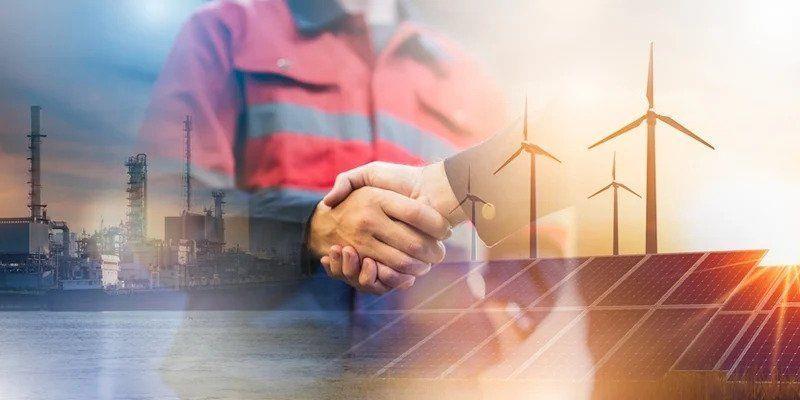
Azerbaijan Positioning Itself As Trans-Regional Energy Hub Through Expanding Green Projects

Qabil Ashirov Read more
Green energy holds the secret to human survival in the future because of the increasing incidents of climate disasters around the globe. States, societies, and systems are in the line of fire because of the looming threat of climate change in the world.
It is obvious that the deployment of renewables in the power, heat, and transport sectors is one of the main enablers of keeping the rise in average global temperatures below 1.5°C. In the Net Zero Emissions by 2050 scenario, renewables facilitate electricity generation that is almost completely decarbonised.
Reports say that Azerbaijan may be directly affected by decarbonization on a global scale. Consequently, Azerbaijan may face both water scarcity and extreme hot weather in the coming years. It will especially affect agriculture.
According to the report of the UN Intergovernmental Panel on Climate Change (IPCC), the average annual temperature in the territory of Azerbaijan has increased by 0.4-1.3 degrees in the last 100 years. Azerbaijan will be among the nations with the most severe water shortages by 2040, and water supply will drop by 23 percent.
Speaking to Azernews on the issue, Dr. Mehmood ul Hassan Khan noted that unfortunately, its biggest river, Kura, is becoming drier, and due to a drought, Kura has not been able to reach the Caspian Sea for two years, which vividly reflects the negative effects of carbon dioxide gases in the country. He added that, despite being a responsible member of the international community, Azerbaijan only contributes 0.11 percent to global greenhouse gas emissions.
“However, it started to actively participate in numerous decarbonisation initiatives to address climate change. The adoption of the laws on "Efficient use of energy resources and energy efficiency", "National Action Plan on Energy Efficiency" and "Roadmap to Accelerate the Adoption of Eco-Design and Labelling Requirements for Energy-Using Products". In addition, the "Azerbaijan 2030: National Priorities for Socio-Economic Development" program was announced in February 2021. The fifth priority mentioned in the program envisages the transition to "green development" by contributing to a clean environment. In May 2021, the law "On the use of renewable energy sources in the production of electricity" was adopted to expand the action plan in the speedy transition to clean energy,” he emphasised.
The expert pointed out that Azerbaijan also plans to export 5 GW of electricity to Europe by 2030. A total of 4 GW will be exported under the Black Sea, and one GW will be exported from Nakhchivan through Turkiye for which integrated projects have already been initiated, which would be a game changer in terms of reduction of ratios or incidents of climate change, generation of more revenue from the exports of renewables to Europe, and ultimately, the role of Azerbaijan in the renewable supply chain would be further enhanced in the days to come, providing it with a more forceful socio-economic, geopolitical, and geostrategic role to secure its vested interests.
“Most recently, President Ilham Aliyev signed a decree declaring 2024 the Green World Solidarity Year and reaffirming Azerbaijan's commitments to global climate change efforts. The document aims to set a framework for the 2024 UN Climate Change Conference (COP29), which will take place in Azerbaijan next year. Frankly speaking, the holding of COP29 in Azerbaijan reflects the international community's profound respect and trust in Azerbaijan, recognising the nation's endeavours in environmental protection and addressing climate change on national, regional, and global scales.
Green energy has great prospects in Azerbaijan. It has already announced to generate 30 percent of its electricity from renewable sources and to export 4 GW of energy to Europe through the cables passing the Black Sea by 2030, which has great trans-regional socio-economic, geopolitical, and geostrategic multiplier effects,” Dr. Mehmoud ul Hassan Khan said.
He reminded that in 2022, the Republic of Azerbaijan, Georgia, Romania, and Hungary signed the“Agreement on a Strategic Partnership in the Field of Green Energy Development and Transmission. It also intends to transfer the electricity produced in Central Asia through its territories in the future.
“Most recently, it signed a joint declaration with Kazakhstan and Uzbekistan to export electricity generated from renewable sources to European countries. The rapidly changing geopolitical and geostrategic conditions of South Caucasus, Central Asia, the Black Sea, and of course Caspian Sea and increasing energy demand in Europe have many matching boxes however, many regional stakeholders of oil & gas and even global movers & shakers will try to derail this mega project. In this regard, I suggest that policymakers of Azerbaijan should include China and its trans-regional megaproject BRI to complete it in the future,” he said.
Mehmoud ul Hassan noted that energy, specifically green energy, has become the hottest source of investment and revenue generation for the states in the world. It has also attached numerous geopolitical and geostrategic dividends. Azerbaijan's plan to export green energy would further enhance its economic stability and sustainability.
“It will also further enhance its national drive for economic and energy diversification, fetching lots of socio-economic and geopolitical dividends in the future. It is predicted that it will also increase the role of Azerbaijan from being a member of the Middle Corridor to a mainstream connecting hub of trans-regional energy and renewables,” he noted.
He pointed out that Azerbaijan has committed to reducing its greenhouse gas emissions by 30 percent from 1990 levels by 2030 and by 40 percent by 2050, as part of the Paris Climate Agreement. To achieve this strategic goal, it has formed the Renewable Energy Agency, which ensures the active participation of the private sector in the country. Ultimately, it has increased the share of installed electricity generation from renewable energy sources.
“In October 2023, a 230-megawatt solar power plant in Baku's Garadagh district with an investment from Masdar was inaugurated. The $200m station will produce 1.5 billion kilowatt hours of energy per year and will reduce carbon emissions by 200,000 tons.
Moreover, the acceleration of green energy space, energy efficiency, and the usage of electric vehicles will be prioritised concurrently. According to the State Customs Committee, the usage of EVs is on the rise, which has increased by 6.2 times as compared to 2022,” Dr. Mehmoud Ul Hassan Khan said.
The pundit underscored that according to the June 2021 BP Statistical Review of World Energy, at the end of 2020, Azerbaijan's oil reserves of 7 bn barrels (1 Mt) accounted for 0.4 percent of global reserves. Furthermore, the country also has an estimated 2.5 trillion cubic meters of proven natural gas reserves. A comparative study of many published reports suggests that its energy mix is heavily concentrated in fossil fuels, with oil and gas accounting for more than 98 percent of the total supply.
“It is a good omen that Azerbaijan's renewable energy potential promises multiple advantages for the country. Relying more on renewable energy would help Azerbaijan save natural gas for exports and for use in the petrochemical industry; reduce the country's GHG emissions to meet its 2030 Paris Agreement commitment; and improve electricity security by diversifying generation,” the expert concluded.
Legal Disclaimer:
MENAFN provides the
information “as is” without warranty of any kind. We do not accept
any responsibility or liability for the accuracy, content, images,
videos, licenses, completeness, legality, or reliability of the information
contained in this article. If you have any complaints or copyright
issues related to this article, kindly contact the provider above.



















Comments
No comment